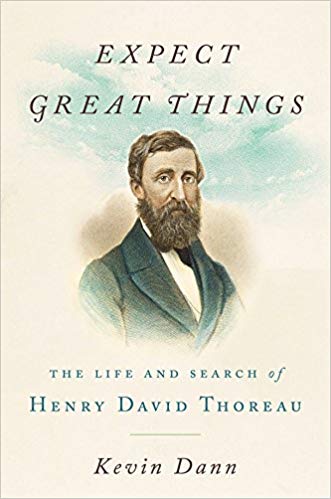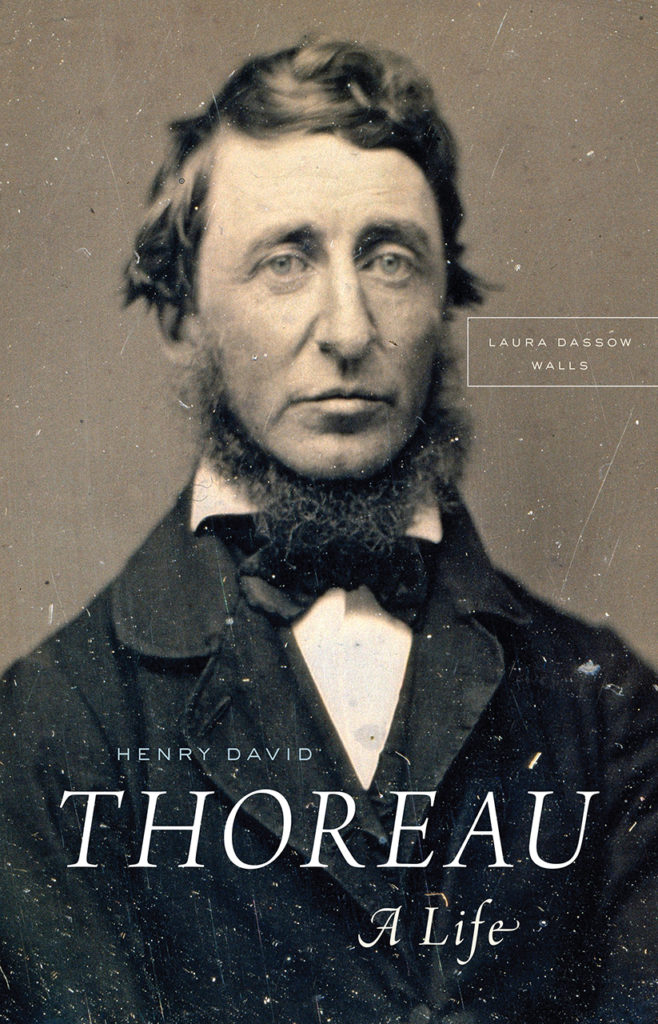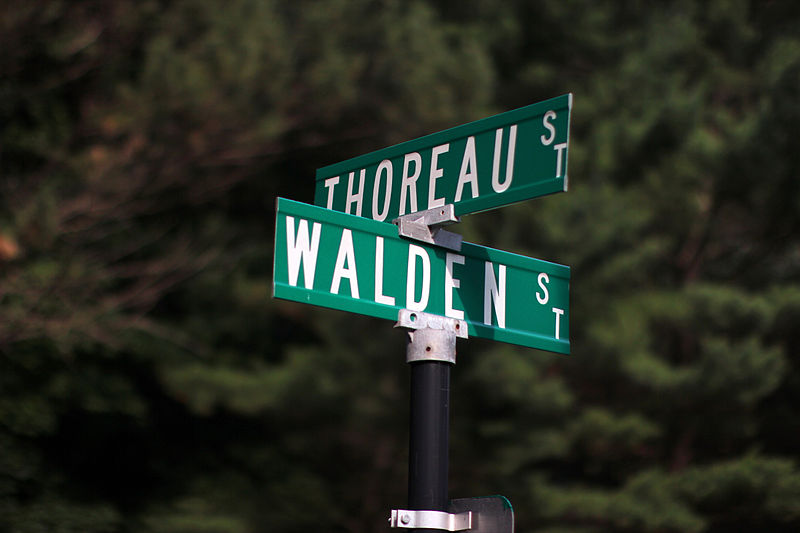Henry David Thoreau: Saint of the Environmental Movement?
Two new biographies emphasize the importance of religion in Thoreau’s life and work.
Henry David Thoreau is often called a “saint” of the environmental movement. If a saint is someone who is revered for his holiness, to whom devotees pray, whose shrines are visited by pilgrims, and who is also regularly debunked by skeptics – Thoreau fits the description. For many who consider themselves environmentalists, Thoreau’s life serves as a great, saintly example. This was the man who loved Walden Woods, who lived close to the seasons, and who revered trees and other non-human species. Contemporary readers, fed up with the environmental harms that industrial civilization has wrought, often view him as a prophet, calling American society to a more wholesome way of living with nature.
Still, the skeptical debunkers have a point too: contemporary environmental problems will not be resolved by mass conversion to Thoreauvian nature piety. Those problems – especially climatic disruption, but also any number of other environmental harms like pollution, species extinction, and interference with nitrogen cycles – are now political problems. Their amelioration will come, if it does, through concerted efforts to gain the political power required to make meaningful changes to contemporary economic and governmental practices. Loving trees may well be a good place to start, and the right thing to do, but it cannot be the end of the story if we want future generations, both human and non-human, to thrive on Earth.
In this context, it’s fair enough to wonder if Thoreau should retain his saintly halo among environmentalists.
Two new biographies from 2017, the year of Thoreau’s 200th birthday, serve as a test for this question. Unlike the majority of scholarship on Thoreau, both books attend to the importance of religion in Thoreau’s life. Both new biographies are, therefore, welcome additions to a literature that has too often been tone-deaf to the importance of religion in Thoreau’s life and work.
 Kevin Dann’s Expect Great Things (TarcherPerigee, 2017) is, first of all, weird. It aims to situate Thoreau in what Dann describes as the “esoteric” thought of his era – the millenarianism, Freemasonry, astrology, alchemy, fascination with faerie, magic, spiritualism, and somnambulism that captivated the US at the time. And Dann – like the movements he describes – assumes the reality of spiritual forces, an assumption that has been rare in the pages of more scholarly works. His voice is thus unique among academic authors writing about Thoreau.
Kevin Dann’s Expect Great Things (TarcherPerigee, 2017) is, first of all, weird. It aims to situate Thoreau in what Dann describes as the “esoteric” thought of his era – the millenarianism, Freemasonry, astrology, alchemy, fascination with faerie, magic, spiritualism, and somnambulism that captivated the US at the time. And Dann – like the movements he describes – assumes the reality of spiritual forces, an assumption that has been rare in the pages of more scholarly works. His voice is thus unique among academic authors writing about Thoreau.
The strength of Dann’s approach is that it reanimates the mythic world that Thoreau occupied, and it acquaints readers with some of the spirits that lived with him in Concord. Dann’s treatment of Greek myth, of fairy stories, of beliefs about the stars, and his insistence that Thoreau’s relationship with God and respect for Christ never waned, correct for some contemporary readers’ tendency to ignore Thoreau’s religious commitments. Dann’s frank account of Thoreau’s misconceptions about native people is also welcome in a book that tends never to find fault with him. (Though Dann’s strange cooptation of the word “indigenous” for the literature that Thoreau and others were trying to create in the United States, and his occasional tendency to revert to descriptions of North America as “unexplored” seems in tension with his evident learning about the First Nations of that continent.)
There are places where a serious reader will want more documentation than Dann provides, or doubt his judgment with respect to the spiritual forces he describes, but Dann admits at the end of the book that his account is more like the mythologies Thoreau himself read and wrote than a list of facts about Thoreau’s life. “Henry Thoreau, the indefatigable measurer of trees and truth, would ask that our measurement of his life hew to the facts, but that we then read those facts with an enlarged sense of meaning.” Dann aims to open our ears to the rhythms of the cosmos, to open our eyes to the fairies in the woods, and to open our minds to the “vast cosmos of esoteric thought” that he sees behind Thoreau’s life.
Dann is right, of course, that Thoreau’s life ought to mean more to us than a list of historical facts. Every book about Thoreau (and there are many, every year) participates in the controversy over what the meaning of his life really is, for us. But where so many of our current questions, especially with respect to environmental problems, are political ones, Dann’s account of Thoreau’s religion obscures the intrinsic connection between Thoreau’s spiritual life and the political efforts for justice that also animated his writing.
 Thus, Laura Dassow Walls’s Henry David Thoreau: A Life (University of Chicago Press, 2017) offers a welcome antidote to the common tendency (not only in Expect Great Things but also more broadly) to describe Thoreau’s religion and spirituality apart from his political commitment to justice. Walls’s is the best new biography of Thoreau since Robert Richardson’s Henry Thoreau: A Life of the Mind (1988), which was the standard until last year. Walls’s writing is also beautiful.
Thus, Laura Dassow Walls’s Henry David Thoreau: A Life (University of Chicago Press, 2017) offers a welcome antidote to the common tendency (not only in Expect Great Things but also more broadly) to describe Thoreau’s religion and spirituality apart from his political commitment to justice. Walls’s is the best new biography of Thoreau since Robert Richardson’s Henry Thoreau: A Life of the Mind (1988), which was the standard until last year. Walls’s writing is also beautiful.
Walls is a scholar of literature and science, and her first book, Seeing New Worlds (1995), considered Thoreau as a scientist, arguing that his work had aimed to breech the boundaries growing among academic disciplines in his period. Her work since has included books on Ralph Waldo Emerson and Alexander von Humboldt, and her reading in the primary sources of the period is extraordinarily vast. She is part of a growing movement in the study of Thoreau that interprets his life and work as deeply situated in the social, cultural, and material history of his context, and this biography will be the standard for a long time to come.
Rejecting the tendency among some scholars of Transcendentalism to focus on literary and intellectual life, Walls’s account of Thoreau’s milieu attends to Concord’s citizens of all ages, classes, ethnicities, and genders, and she treats religion with great sensitivity. Where Dann purposefully focuses on esoteric thought (and sometimes seems to be cherry-picking evidence from all the two million words in Thoreau’s journal), Walls’s biographical approach is less focused on religion – in fact religion is not thematized much at all – but it is also less sensational, more subtle, and better attuned to the major religious influences on Thoreau’s thought.
This also means that she aids in the important effort — especially for our period — of reconciling Thoreau’s nature piety with his political commitment, two strands of Thoreau’s work that have often come apart in the literature. Dann’s mistake is a common one. Too often, accounts of Thoreau’s spirituality have deemphasized its relation to his politics. Thoreau’s essay on the duties of a citizen to resist an unjust government, “Resistance to Civil Government,” posthumously known as “Civil Disobedience,” inspired much liberatory politics of the 20th century. Famously, Gandhi and Martin Luther King Jr. attributed some of their own political views to lessons they learned from Thoreau.
The conclusion of Walls’s account of “Civil Disobedience” elegantly describes how resistance to injustice and love of nature were part of one thing for Thoreau:
“Resistance” means not just self-defense, defense of one’s fellow citizen, or even of one’s own nation, but defense of all those lives entangled with our own: slaves, upon whose labor even “free” Massachusetts depended economically; Mexicans, the declared enemies of the State; and Indians, the declared enemies of civilization itself. But Thoreau was not finished even here. Life at Walden Pond helped him understand how deeply humans are related to nonhumans as well…In the same weeks he was finishing “Resistance to Civil Government,” Thoreau put the final touches on A Week on the Concord and Merrimack Rivers. “Who hears the fishes when they cry?” he asked in its opening pages…What he worked out in writing “Resistance to Civil Government” became not only the foundation of his political philosophy but also the gateway to his environmental ethics.
This is the wisdom from Thoreau we need now, in an age of inequality made so much worse by climate change. Walls’s account of the intrinsic connection in Thoreau’s thought between his nature piety and his emphatic commitment to justice for human communities offers us more than Dann’s ethereal Thoreau. Walls’s Thoreau can hold together our outrage over the injustices committed by our nation with our outrage at the ruination of what Thoreau called nature, which is – of course – our home.
This Thoreau need not be a saint for us, no man is perfect, and we can learn much from his defects as well as from his virtues. But before we dismiss him as too enmeshed in the woods to do us any good where we are, here in the 21st century, we should remember that our most vicious environmental problems are matters of injustice: against those whose island nations contribute so little to carbon emissions and yet are succumbing to sea-level rise, against those whose neighbourhoods are unrepresented in our government and yet bear the burden of our communal toxic waste, against refugees whose climates are rapidly becoming uninhabitable, and against a whole world of other-than-human species whose lives are in collapse. Against these injustices, Thoreau’s religion would preach properly political resistance.
***
Alda Balthrop-Lewis is a Research Fellow in the Institute for Religion and Critical Inquiry at Australian Catholic University. Before coming to ACU she completed a B.A. at Stanford University, a M.Div. at The University of Chicago and a Ph.D. at Princeton University in Religion, Ethics, and Politics. She has taught in the Religious Studies department at Brown University, and she has worked as a research assistant for the Peabody Award-winning public radio program On Being, produced in the United States. Her research focuses on religious ethics and the circulation of ideas among theological, artistic, and popular idioms. Her current work, Thoreau’s Religion: Walden Woods, Social Justice, and the Politics of Asceticism (forthcoming from Cambridge University Press), treats Henry David Thoreau as an inheritor of traditional ascetic practices, and argues that his asceticism is politically relevant – both in his period and for contemporary environmental ethics.
***
Published with support from the Henry R. Luce Initiative on Religion in International Affairs
